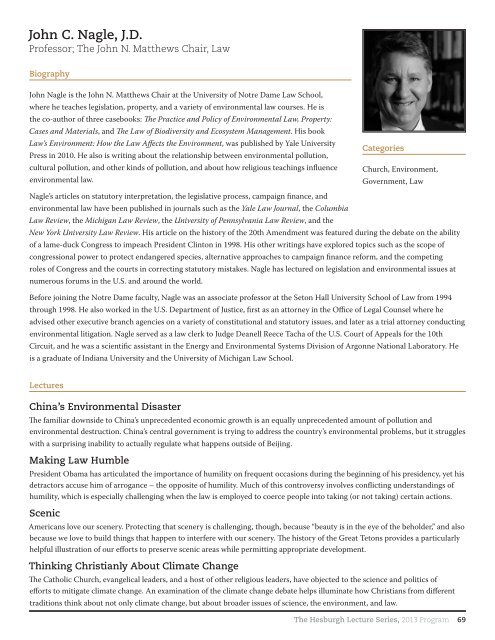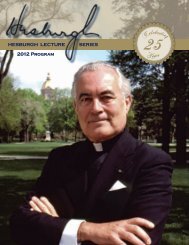HESBURGH LECTURE SERIES 2013 Program - Alumni Association ...
HESBURGH LECTURE SERIES 2013 Program - Alumni Association ...
HESBURGH LECTURE SERIES 2013 Program - Alumni Association ...
You also want an ePaper? Increase the reach of your titles
YUMPU automatically turns print PDFs into web optimized ePapers that Google loves.
John C. Nagle, J.D.<br />
Professor; The John N. Matthews Chair, Law<br />
Biography<br />
John Nagle is the John N. Matthews Chair at the University of Notre Dame Law School,<br />
where he teaches legislation, property, and a variety of environmental law courses. He is<br />
the co-author of three casebooks: The Practice and Policy of Environmental Law, Property:<br />
Cases and Materials, and The Law of Biodiversity and Ecosystem Management. His book<br />
Law’s Environment: How the Law Affects the Environment, was published by Yale University<br />
Press in 2010. He also is writing about the relationship between environmental pollution,<br />
cultural pollution, and other kinds of pollution, and about how religious teachings influence<br />
environmental law.<br />
Nagle’s articles on statutory interpretation, the legislative process, campaign finance, and<br />
environmental law have been published in journals such as the Yale Law Journal, the Columbia<br />
Law Review, the Michigan Law Review, the University of Pennsylvania Law Review, and the<br />
New York University Law Review. His article on the history of the 20th Amendment was featured during the debate on the ability<br />
of a lame-duck Congress to impeach President Clinton in 1998. His other writings have explored topics such as the scope of<br />
congressional power to protect endangered species, alternative approaches to campaign finance reform, and the competing<br />
roles of Congress and the courts in correcting statutory mistakes. Nagle has lectured on legislation and environmental issues at<br />
numerous forums in the U.S. and around the world.<br />
Before joining the Notre Dame faculty, Nagle was an associate professor at the Seton Hall University School of Law from 1994<br />
through 1998. He also worked in the U.S. Department of Justice, first as an attorney in the Office of Legal Counsel where he<br />
advised other executive branch agencies on a variety of constitutional and statutory issues, and later as a trial attorney conducting<br />
environmental litigation. Nagle served as a law clerk to Judge Deanell Reece Tacha of the U.S. Court of Appeals for the 10th<br />
Circuit, and he was a scientific assistant in the Energy and Environmental Systems Division of Argonne National Laboratory. He<br />
is a graduate of Indiana University and the University of Michigan Law School.<br />
Lectures<br />
China’s Environmental Disaster<br />
The familiar downside to China’s unprecedented economic growth is an equally unprecedented amount of pollution and<br />
environmental destruction. China’s central government is trying to address the country’s environmental problems, but it struggles<br />
with a surprising inability to actually regulate what happens outside of Beijing.<br />
Making Law Humble<br />
President Obama has articulated the importance of humility on frequent occasions during the beginning of his presidency, yet his<br />
detractors accuse him of arrogance – the opposite of humility. Much of this controversy involves conflicting understandings of<br />
humility, which is especially challenging when the law is employed to coerce people into taking (or not taking) certain actions.<br />
Scenic<br />
Americans love our scenery. Protecting that scenery is challenging, though, because “beauty is in the eye of the beholder,” and also<br />
because we love to build things that happen to interfere with our scenery. The history of the Great Tetons provides a particularly<br />
helpful illustration of our efforts to preserve scenic areas while permitting appropriate development.<br />
Thinking Christianly About Climate Change<br />
Categories<br />
The Catholic Church, evangelical leaders, and a host of other religious leaders, have objected to the science and politics of<br />
efforts to mitigate climate change. An examination of the climate change debate helps illuminate how Christians from different<br />
traditions think about not only climate change, but about broader issues of science, the environment, and law.<br />
Church, Environment,<br />
Government, Law<br />
The Hesburgh Lecture Series, <strong>2013</strong> <strong>Program</strong> 69



